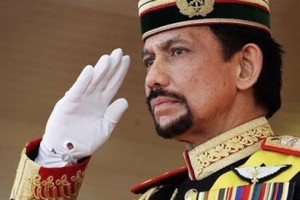Hassanal Bolkiah was crowned Sultan of Brunei in August 1968. After Bhumidal Adulyadej of Thailand, Queen Elizabeth II, Almu’tasimu Billahi Muhibbuddin Tuanku Alhaj Abdul Halim Mu’adzam Shah Ibni Almarhum Sultan Badlishah of Malaysia (whose name is nearly as long as his 54 year reign), and Oba Aetona of Nigeria, Bolkiah is one of the longest-reigning monarchs in the world.
Known to some as the ‘shellfare state’, Brunei is heavily endowed with oil and gas resources. The 407,000 inhabitants enjoy free schooling and healthcare without being made to pay tax. The fruits of the oil industry are not, however, shared by Brunei’s rapidly industrialising neighbour Malaysia, which has a Gross National Income (GNI) of US$7,700 (£4,875) compared with Brunei’s US$31,800 (£20,132).
Backed by Oil
This rosy picture is undermined by an unsustainable political system. In 1991, amid calls for the democratisation of the state, the Sultan introduced a policy named ‘Malay Islam Monarchy’, where the members of the monarchy became the official ‘defenders’ of Islam.
Through religion the Sultan has been able to maintain control of the people. The primary internet service provider is state-owned, and although only 33% of the population have access to internet, it is monitored for ‘subversive’ sites or messages including pornography which, if detected, leave the perpetrator subject to fines or imprisonment.
In 2005, the Sedition Act was passed to regulate the national press, preventing publication of any criticisms of the religious or monarchical system. Freedom House, an international organisation dedicated to the survey of political rights and civil liberties, judges Brunei on a regressive scale from one to seven at just six.
At Odds with Global Investors
However, the religio-monarchical structure causes more tension with foreigners than with locals. Positive discrimination gives religious elites and those related to the Sultan extensive social privileges. International companies can struggle to work effectively in Brunei because of the social barriers preventing criticism of those holding prestigious positions, many of which are not earned on the basis of merit. A British Gurkha regiment stationed at the Shell oil refinery is perhaps a sign of a further burden from working in this volatile environment.
Stuart Rylance, an affiliate of Shell Brunei, said: “[Shell] are now employing more Arabs from Qatar and the United Arab Emirates” instead of Europeans, due to religious barriers. Indians are also being drafted in.
Despite this, there is an expatriate community in Brunei made up mostly of Dutch oil employees and British nationals left over from colonial rule which lasted until 1984. Furthermore, it does not look like Shell will be moving from the huge oil and gas supplies in Brunei any time soon.
Alienated by the theocratic Sultanate and small in number, the expatriate community is fairly transient, with most spending only four years in the country. They are allowed bacon once a year, and, while Europeans are allowed to import heavily taxed alcohol, Chinese residents have to find it illegally.
Fabulously Rich
It is ironic that the Bruneian Sultanate is famously extravagant. As well as owning one of the most extensive collections of super-cars on earth, Prince Jaffri, Bolkiah’s younger brother, is said to own two boats affectionately named “Tit 1” and “Tit 2”. Jaffri, who was allegedly expelled from Brunei for organising an all-female naked tennis match, was sued by Bolkiah in 2000 for misspending US$15 billion (£9.6 billion).
There are inherent contradictions between the philosophy of the state and its actual running. The monarchy act irresponsibly at times, and a huge proportion of the potential wealth is consumed by them. The state is desperately undemocratic and the people do not have the freedom to say what they want. Despite this, it does not appear that a population which does not pay tax and enjoys a high standard of living see this as unfair. With a life expectancy of 81 for a woman and 76 for a man, they have the freedom to live far longer than in most other countries in the region.
The system in Brunei seems temporary, bolstered by unsustainable oil money in a nation that is by many standards undeveloped. The freedom of the people appears to be bribed from them with black gold. Even a thieving and philandering monarchy are not publicly opposed by the Brunein people, as there is not yet enough of an incentive to go against the weight of the system. The question is, however, for how long can this go on?




